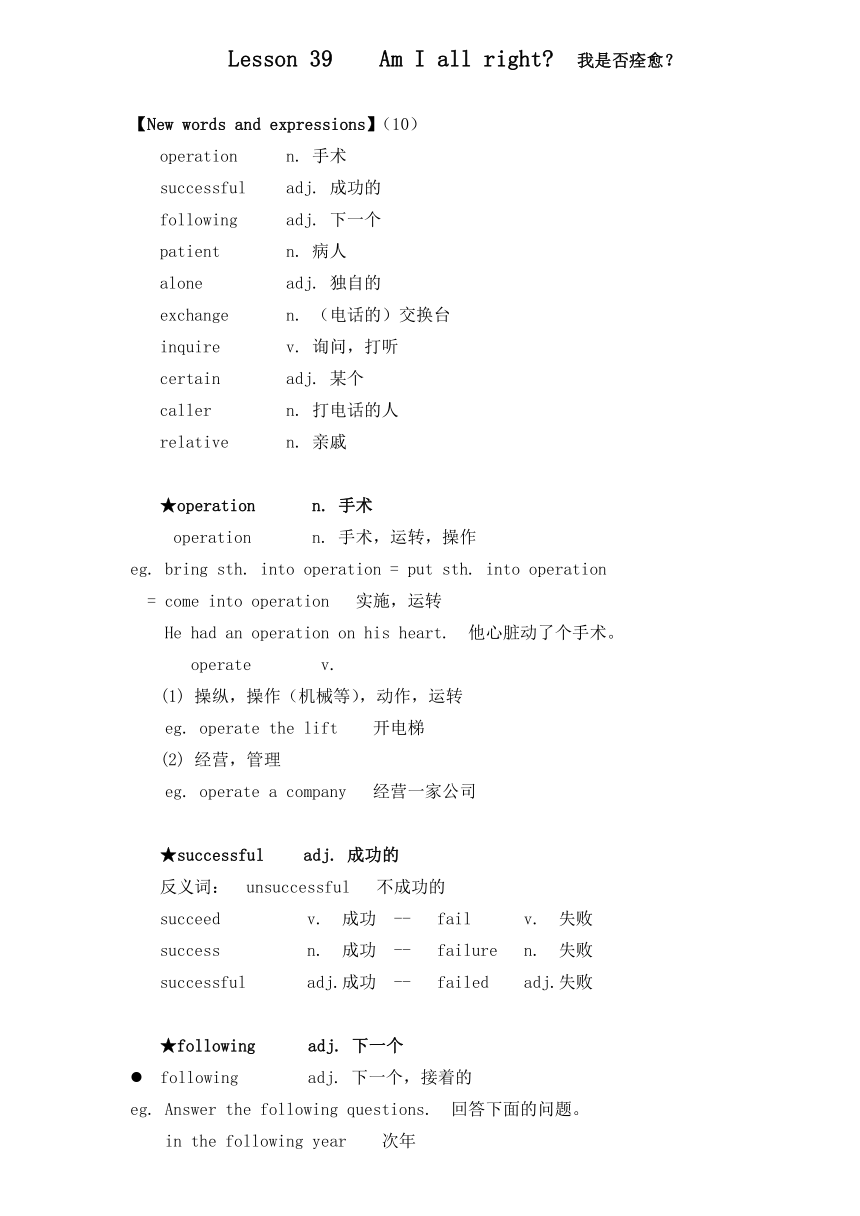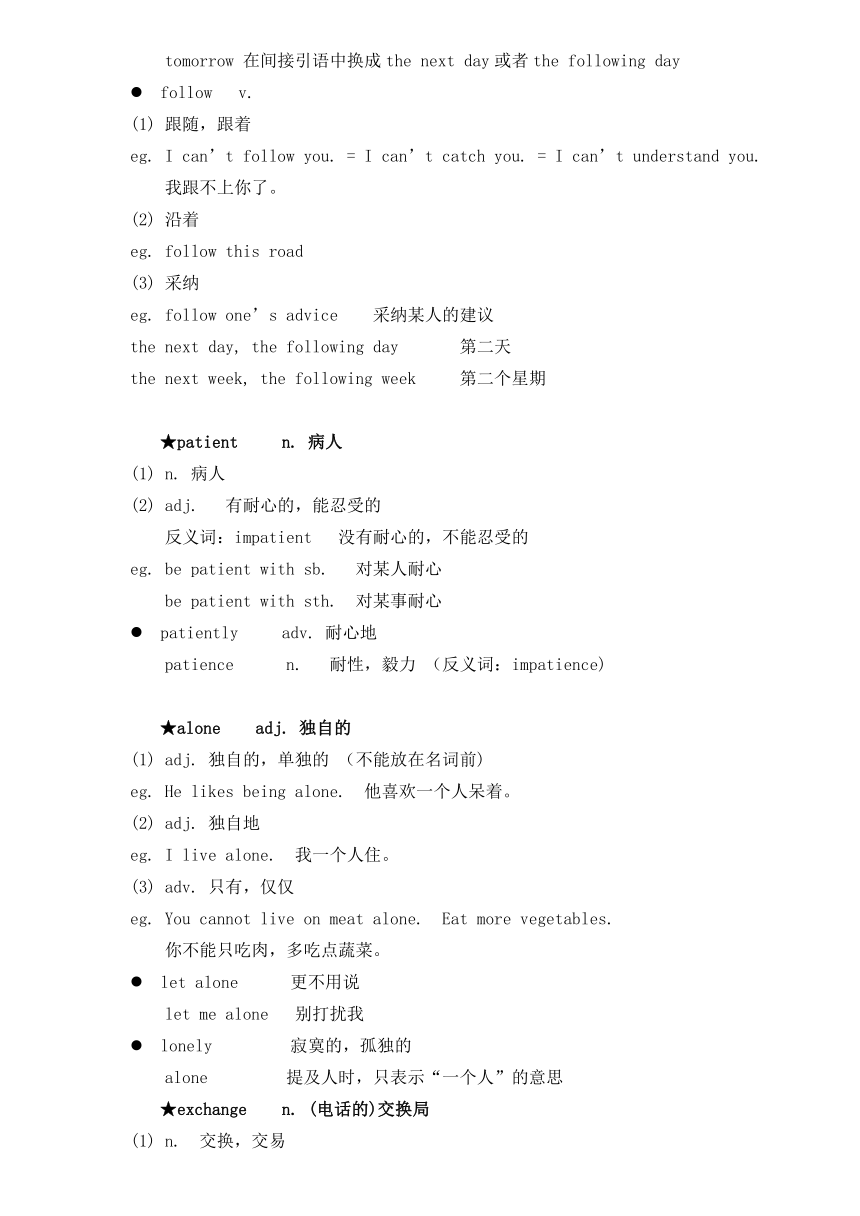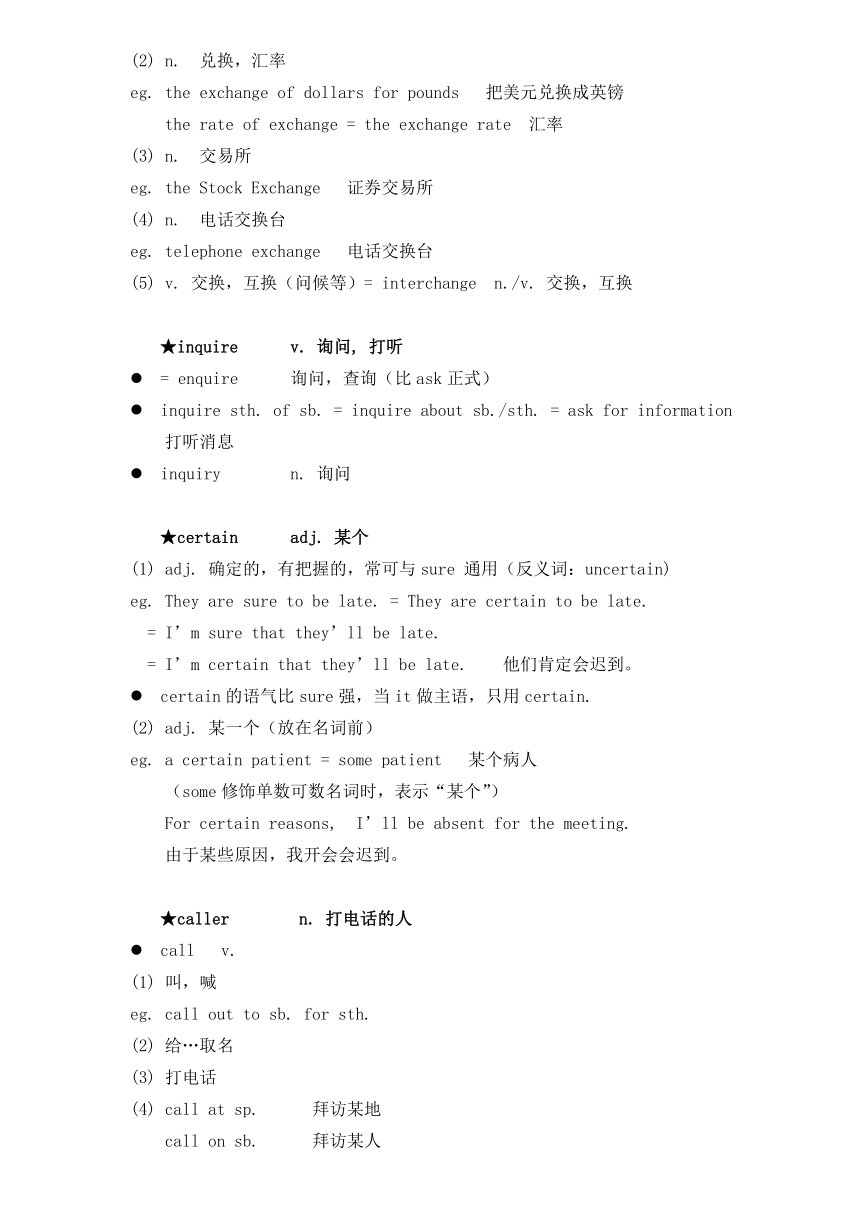新概念英语二册超详教案讲义笔记Lesson 39 Am I all right 我是否痊愈
文档属性
| 名称 | 新概念英语二册超详教案讲义笔记Lesson 39 Am I all right 我是否痊愈 |  | |
| 格式 | docx | ||
| 文件大小 | 27.3KB | ||
| 资源类型 | 教案 | ||
| 版本资源 | 新概念英语 | ||
| 科目 | 英语 | ||
| 更新时间 | 2023-09-26 06:55:19 | ||
图片预览




文档简介
Lesson 39 Am I all right 我是否痊愈?
【New words and expressions】(10)
operation n. 手术
successful adj. 成功的
following adj. 下一个
patient n. 病人
alone adj. 独自的
exchange n. (电话的)交换台
inquire v. 询问,打听
certain adj. 某个
caller n. 打电话的人
relative n. 亲戚
★operation n. 手术
operation n. 手术,运转,操作
eg. bring sth. into operation = put sth. into operation
= come into operation 实施,运转
He had an operation on his heart. 他心脏动了个手术。
operate v.
操纵,操作(机械等),动作,运转
eg. operate the lift 开电梯
经营,管理
eg. operate a company 经营一家公司
★successful adj. 成功的
反义词: unsuccessful 不成功的
succeed v. 成功 -- fail v. 失败
success n. 成功 -- failure n. 失败
successful adj.成功 -- failed adj.失败
★following adj. 下一个
following adj. 下一个,接着的
eg. Answer the following questions. 回答下面的问题。
in the following year 次年
tomorrow 在间接引语中换成the next day或者the following day
follow v.
跟随,跟着
eg. I can’t follow you. = I can’t catch you. = I can’t understand you.
我跟不上你了。
沿着
eg. follow this road
采纳
eg. follow one’s advice 采纳某人的建议
the next day, the following day 第二天
the next week, the following week 第二个星期
★patient n. 病人
n. 病人
adj. 有耐心的,能忍受的
反义词:impatient 没有耐心的,不能忍受的
eg. be patient with sb. 对某人耐心
be patient with sth. 对某事耐心
patiently adv. 耐心地
patience n. 耐性,毅力 (反义词:impatience)
★alone adj. 独自的
(1) adj. 独自的,单独的 (不能放在名词前)
eg. He likes being alone. 他喜欢一个人呆着。
adj. 独自地
eg. I live alone. 我一个人住。
adv. 只有,仅仅
eg. You cannot live on meat alone. Eat more vegetables.
你不能只吃肉,多吃点蔬菜。
let alone 更不用说
let me alone 别打扰我
lonely 寂寞的,孤独的
alone 提及人时,只表示“一个人”的意思
★exchange n. (电话的)交换局
n. 交换,交易
n. 兑换,汇率
eg. the exchange of dollars for pounds 把美元兑换成英镑
the rate of exchange = the exchange rate 汇率
n. 交易所
eg. the Stock Exchange 证券交易所
n. 电话交换台
eg. telephone exchange 电话交换台
(5) v. 交换,互换(问候等)= interchange n./v. 交换,互换
★inquire v. 询问, 打听
= enquire 询问,查询(比ask正式)
inquire sth. of sb. = inquire about sb./sth. = ask for information
打听消息
inquiry n. 询问
★certain adj. 某个
(1) adj. 确定的,有把握的,常可与sure 通用(反义词:uncertain)
eg. They are sure to be late. = They are certain to be late.
= I’m sure that they’ll be late.
= I’m certain that they’ll be late. 他们肯定会迟到。
certain的语气比sure强,当it做主语,只用certain.
(2) adj. 某一个(放在名词前)
eg. a certain patient = some patient 某个病人
(some修饰单数可数名词时,表示“某个”)
For certain reasons, I’ll be absent for the meeting.
由于某些原因,我开会会迟到。
★caller n. 打电话的人
call v.
叫,喊
eg. call out to sb. for sth.
给…取名
打电话
call at sp. 拜访某地
call on sb. 拜访某人
call off 取消
call box 公共电话亭
★relative n. 亲戚
n. 亲戚,亲属
eg. a close relative = a near relative 近亲
a distant relative 远亲
adj. 相关的,相对的
relation n. 亲戚,关系
relationship n. 关系
【Text】
While John Gilbert was in hospital, he asked his doctor to tell him whether his operation had been successful, but the doctor refused to do so. The following day, the patient asked for a bedside telephone. When he was alone, he telephoned the hospital exchange and asked for Doctor Millington. When the doctor answered the phone, Mr. Gilbert said he was inquiring about a certain patient, a Mr. John Gilbert. He asked if Mr. Gilbert's operation had been successful and the doctor told him that it had been. He then asked when Mr. Gilbert would be allowed to go home and the doctor told him that he would have to stay in hosptial for another two weeks. Then Dr. Millington asked the caller if he was a relative of the patient. 'No,' the patient answered, 'I am Mr. John Gilbert.'
参考译文
当约翰·吉尔伯特住院的时候, 他问医生他的手术是否成功, 但医生拒绝告诉他. 第二天, 这位病人要了一部床头电话. 当房里只剩他一个人时, 他挂通了医院的交换台, 要求与米灵顿医生讲话. 当这位医生接过电话时, 吉尔伯特先生说他想询问一个病人的情况, 是一位名叫约翰·吉尔伯特的先生. 他问吉尔伯特先生的手术是否成功, 医生告诉他手术很成功. 然后他又问吉尔伯特先生什么时候可以回家, 医生说他在医院还必须再住上两个星期. 之后, 米灵顿医生问打电话的人是否是病人的亲属. “不是, “病人回答说, “我就是约翰·吉尔伯特先生. “
【课文讲解】
1、Am I all right
all right当指人的健康状况时,可表示“安然无恙的,良好的”
eg. I was not very well last week, but I feel all right now.
2、While John Gilbert was in hospital, he asked his doctor to tell him whether his operation had been successful, but the doctor refused to do so.
所问的原句是: “Was my operation successful ”
while conj.
当…时候,和…同时
eg. He took a bath while I was preparing dinner.
while 所引导的从句与主句主语相同,且while从句的动词为be时,while从句的主语和be动词有时被省略。
eg. He watched TV while he was eating. = He watched TV while eating.
虽然,然而
eg. While I understand your viewpoint, I don’t agree with you.
in hospital 住院 in the hospital 在医院
at school 上学 at the school 在学校
at church 做礼拜 at the church 在教堂
ask sb. to do sth. 叫某人做某事
ask for sth./sb. 要某物/某人
refuse to do sth. 拒绝做某事
So在这里是代词,代替前面的动词不定式(to tell him whether…)。它一般出现believe,do,expect,hope,say,tell,think,appear等之后:
Is it true that John has had an operation
I am afraid so. /I believe so. / I think so. / It seems so.
3、The following day, the patient asked for a bedside telephone.
bedside
adj. 床边的,枕边的
eg. bedside telephone 床头电话
bedside table 床头柜
bedside lamp 床头灯
n. 床边
eg. She was unable to be at his bedside when he died.
the following day = the next day
次日(这里following表示“紧接着的,其次的”。)
4、When he was alone, he telephoned the hospital exchange and asked for Doctor Millington.
When he was alone = When his was on his own 当他一个人的时候
5、When the doctor answered the phone, Mr. Gilbert said he was inquiring about a certain patient, a Mr. John Gilbert.
answer the phone 接电话
answer a letter 回信
answer a question 回答问题
answer sb. 回答某人
answer back 顶嘴
Certain在这里没有“肯定的,确实的”等含义,而表示“某一,某位”,暗指说话者或说话对象可能对这人/这事不大清楚/熟悉,或所指的这个人身份不大清楚:
He asked if Mr. Gilbert’s operation had been successful and the doctor told him that it had been.
原句:Was Mr. Gilbert’s operation successful? Yes, it was.
7、He then asked when Mr. Gilbert would be allowed to go home and the doctor told him that he would have to stay in hosptial for another two weeks.
宾语从句:when Mr. Gilbert would be allowed to go home.
宾语从句:that he would have to stay in hospital for another two weeks.
两个宾语从句,还原为直接引语:
‘When will Mr. Gilbert be allowed to go home ’he asked.
‘He will have to stay in hospital for another two weeks.’the doctor said.
another
(1) adj. 另一个,别的
eg. for another two weeks 又两个星期
another作为限定词表示“另一个,再一个”的时候,通常与可数的单数名词连用,不和复数形式连用;但是后面可以跟基数词/few+复数名词(它们被当成一个整体):
eg. I need another three driving lessons before my test.
考试前我还需上3节驾驶课。
I need another few hours before I can finish my homework.
我还需几个小时才能做完作业。
pron. 另一个人或事物
eg. one child after another 一个孩子接着一个孩子
8、Then Dr. Millington asked the caller if he was a relative of the patient. 'No,' the patient answered, 'I am Mr. John Gilbert.'
原句:
Then Dr.Millington asked, “Are you a relative of the patient ”
【Key structures】
直接引语和间接引语
在引用一个疑问句时,除了注意人称,状语等的变更和时态的一致外,还要注意把引语中的语序变为陈述句的语序,也就是说要把主语放在谓语的前面 。
eg. The secretary asked:“ What’s your job ”
The secretary asked what my job was.
转述一般疑问句时必须使用if或whether,不可省略,助动词do/does和did在转述疑问句里消失了。
eg. He asked: “Are you sure your mother will come ”
He asked if you sure your mother would come.
ask,want to know,wonder等后面的if和whether通常可以互换,但是whether表示的怀疑程度比if稍大。
eg. I wonder if/whether he’s phoned the doctor.
在表示两者挑一时更常用whether:
eg. She asked me whether I wanted tea or coffee.
转述疑问句中带有or not时,通常用whether引导,不用if引导:
eg. He wants to know whether or not we want dinner.
在转述特殊疑问句时,通常用原来的疑问词。在针对主语提问的间接疑问句中,时态和情态助动词照常有变化,但语序保持不变。
eg. Tom asked if / whether Jack would arrive the next day. 汤姆问杰克第二天是否能到.
Jane asked why I hadn't written to her. 简问为什么我不给她写信.
如果直接引语是问句,变为间接引语时,主句不说He said,而用He asked;told可以后跟问句,还可以跟陈述句:
直接引语是表示命令、请求、建议的祈使句通常可用适当的动词后跟不定式来转述,常用的这类动词有advise,ask,tell,order,command,warm,invite等,这些动词后往往有间接宾语,在转述这类祈使句的否定形式时,必须将not放在带to的不定式之前:
eg.She reminded/told me to turn off all the lights.
The teacher was telling/ordering/commanding her students to close their books.
tell sb. to do sth./ ask sb. to do sth.
eg. The teacher told me (not) to open the door.
动词suggest和insist用于转述建议、要求时,其结构为suggest/insist +that从句(用should):
eg. He suggests that they should sell the flat. I hope they won’t sell the flat.
He still insisted that we should help him.
【New words and expressions】(10)
operation n. 手术
successful adj. 成功的
following adj. 下一个
patient n. 病人
alone adj. 独自的
exchange n. (电话的)交换台
inquire v. 询问,打听
certain adj. 某个
caller n. 打电话的人
relative n. 亲戚
★operation n. 手术
operation n. 手术,运转,操作
eg. bring sth. into operation = put sth. into operation
= come into operation 实施,运转
He had an operation on his heart. 他心脏动了个手术。
operate v.
操纵,操作(机械等),动作,运转
eg. operate the lift 开电梯
经营,管理
eg. operate a company 经营一家公司
★successful adj. 成功的
反义词: unsuccessful 不成功的
succeed v. 成功 -- fail v. 失败
success n. 成功 -- failure n. 失败
successful adj.成功 -- failed adj.失败
★following adj. 下一个
following adj. 下一个,接着的
eg. Answer the following questions. 回答下面的问题。
in the following year 次年
tomorrow 在间接引语中换成the next day或者the following day
follow v.
跟随,跟着
eg. I can’t follow you. = I can’t catch you. = I can’t understand you.
我跟不上你了。
沿着
eg. follow this road
采纳
eg. follow one’s advice 采纳某人的建议
the next day, the following day 第二天
the next week, the following week 第二个星期
★patient n. 病人
n. 病人
adj. 有耐心的,能忍受的
反义词:impatient 没有耐心的,不能忍受的
eg. be patient with sb. 对某人耐心
be patient with sth. 对某事耐心
patiently adv. 耐心地
patience n. 耐性,毅力 (反义词:impatience)
★alone adj. 独自的
(1) adj. 独自的,单独的 (不能放在名词前)
eg. He likes being alone. 他喜欢一个人呆着。
adj. 独自地
eg. I live alone. 我一个人住。
adv. 只有,仅仅
eg. You cannot live on meat alone. Eat more vegetables.
你不能只吃肉,多吃点蔬菜。
let alone 更不用说
let me alone 别打扰我
lonely 寂寞的,孤独的
alone 提及人时,只表示“一个人”的意思
★exchange n. (电话的)交换局
n. 交换,交易
n. 兑换,汇率
eg. the exchange of dollars for pounds 把美元兑换成英镑
the rate of exchange = the exchange rate 汇率
n. 交易所
eg. the Stock Exchange 证券交易所
n. 电话交换台
eg. telephone exchange 电话交换台
(5) v. 交换,互换(问候等)= interchange n./v. 交换,互换
★inquire v. 询问, 打听
= enquire 询问,查询(比ask正式)
inquire sth. of sb. = inquire about sb./sth. = ask for information
打听消息
inquiry n. 询问
★certain adj. 某个
(1) adj. 确定的,有把握的,常可与sure 通用(反义词:uncertain)
eg. They are sure to be late. = They are certain to be late.
= I’m sure that they’ll be late.
= I’m certain that they’ll be late. 他们肯定会迟到。
certain的语气比sure强,当it做主语,只用certain.
(2) adj. 某一个(放在名词前)
eg. a certain patient = some patient 某个病人
(some修饰单数可数名词时,表示“某个”)
For certain reasons, I’ll be absent for the meeting.
由于某些原因,我开会会迟到。
★caller n. 打电话的人
call v.
叫,喊
eg. call out to sb. for sth.
给…取名
打电话
call at sp. 拜访某地
call on sb. 拜访某人
call off 取消
call box 公共电话亭
★relative n. 亲戚
n. 亲戚,亲属
eg. a close relative = a near relative 近亲
a distant relative 远亲
adj. 相关的,相对的
relation n. 亲戚,关系
relationship n. 关系
【Text】
While John Gilbert was in hospital, he asked his doctor to tell him whether his operation had been successful, but the doctor refused to do so. The following day, the patient asked for a bedside telephone. When he was alone, he telephoned the hospital exchange and asked for Doctor Millington. When the doctor answered the phone, Mr. Gilbert said he was inquiring about a certain patient, a Mr. John Gilbert. He asked if Mr. Gilbert's operation had been successful and the doctor told him that it had been. He then asked when Mr. Gilbert would be allowed to go home and the doctor told him that he would have to stay in hosptial for another two weeks. Then Dr. Millington asked the caller if he was a relative of the patient. 'No,' the patient answered, 'I am Mr. John Gilbert.'
参考译文
当约翰·吉尔伯特住院的时候, 他问医生他的手术是否成功, 但医生拒绝告诉他. 第二天, 这位病人要了一部床头电话. 当房里只剩他一个人时, 他挂通了医院的交换台, 要求与米灵顿医生讲话. 当这位医生接过电话时, 吉尔伯特先生说他想询问一个病人的情况, 是一位名叫约翰·吉尔伯特的先生. 他问吉尔伯特先生的手术是否成功, 医生告诉他手术很成功. 然后他又问吉尔伯特先生什么时候可以回家, 医生说他在医院还必须再住上两个星期. 之后, 米灵顿医生问打电话的人是否是病人的亲属. “不是, “病人回答说, “我就是约翰·吉尔伯特先生. “
【课文讲解】
1、Am I all right
all right当指人的健康状况时,可表示“安然无恙的,良好的”
eg. I was not very well last week, but I feel all right now.
2、While John Gilbert was in hospital, he asked his doctor to tell him whether his operation had been successful, but the doctor refused to do so.
所问的原句是: “Was my operation successful ”
while conj.
当…时候,和…同时
eg. He took a bath while I was preparing dinner.
while 所引导的从句与主句主语相同,且while从句的动词为be时,while从句的主语和be动词有时被省略。
eg. He watched TV while he was eating. = He watched TV while eating.
虽然,然而
eg. While I understand your viewpoint, I don’t agree with you.
in hospital 住院 in the hospital 在医院
at school 上学 at the school 在学校
at church 做礼拜 at the church 在教堂
ask sb. to do sth. 叫某人做某事
ask for sth./sb. 要某物/某人
refuse to do sth. 拒绝做某事
So在这里是代词,代替前面的动词不定式(to tell him whether…)。它一般出现believe,do,expect,hope,say,tell,think,appear等之后:
Is it true that John has had an operation
I am afraid so. /I believe so. / I think so. / It seems so.
3、The following day, the patient asked for a bedside telephone.
bedside
adj. 床边的,枕边的
eg. bedside telephone 床头电话
bedside table 床头柜
bedside lamp 床头灯
n. 床边
eg. She was unable to be at his bedside when he died.
the following day = the next day
次日(这里following表示“紧接着的,其次的”。)
4、When he was alone, he telephoned the hospital exchange and asked for Doctor Millington.
When he was alone = When his was on his own 当他一个人的时候
5、When the doctor answered the phone, Mr. Gilbert said he was inquiring about a certain patient, a Mr. John Gilbert.
answer the phone 接电话
answer a letter 回信
answer a question 回答问题
answer sb. 回答某人
answer back 顶嘴
Certain在这里没有“肯定的,确实的”等含义,而表示“某一,某位”,暗指说话者或说话对象可能对这人/这事不大清楚/熟悉,或所指的这个人身份不大清楚:
He asked if Mr. Gilbert’s operation had been successful and the doctor told him that it had been.
原句:Was Mr. Gilbert’s operation successful? Yes, it was.
7、He then asked when Mr. Gilbert would be allowed to go home and the doctor told him that he would have to stay in hosptial for another two weeks.
宾语从句:when Mr. Gilbert would be allowed to go home.
宾语从句:that he would have to stay in hospital for another two weeks.
两个宾语从句,还原为直接引语:
‘When will Mr. Gilbert be allowed to go home ’he asked.
‘He will have to stay in hospital for another two weeks.’the doctor said.
another
(1) adj. 另一个,别的
eg. for another two weeks 又两个星期
another作为限定词表示“另一个,再一个”的时候,通常与可数的单数名词连用,不和复数形式连用;但是后面可以跟基数词/few+复数名词(它们被当成一个整体):
eg. I need another three driving lessons before my test.
考试前我还需上3节驾驶课。
I need another few hours before I can finish my homework.
我还需几个小时才能做完作业。
pron. 另一个人或事物
eg. one child after another 一个孩子接着一个孩子
8、Then Dr. Millington asked the caller if he was a relative of the patient. 'No,' the patient answered, 'I am Mr. John Gilbert.'
原句:
Then Dr.Millington asked, “Are you a relative of the patient ”
【Key structures】
直接引语和间接引语
在引用一个疑问句时,除了注意人称,状语等的变更和时态的一致外,还要注意把引语中的语序变为陈述句的语序,也就是说要把主语放在谓语的前面 。
eg. The secretary asked:“ What’s your job ”
The secretary asked what my job was.
转述一般疑问句时必须使用if或whether,不可省略,助动词do/does和did在转述疑问句里消失了。
eg. He asked: “Are you sure your mother will come ”
He asked if you sure your mother would come.
ask,want to know,wonder等后面的if和whether通常可以互换,但是whether表示的怀疑程度比if稍大。
eg. I wonder if/whether he’s phoned the doctor.
在表示两者挑一时更常用whether:
eg. She asked me whether I wanted tea or coffee.
转述疑问句中带有or not时,通常用whether引导,不用if引导:
eg. He wants to know whether or not we want dinner.
在转述特殊疑问句时,通常用原来的疑问词。在针对主语提问的间接疑问句中,时态和情态助动词照常有变化,但语序保持不变。
eg. Tom asked if / whether Jack would arrive the next day. 汤姆问杰克第二天是否能到.
Jane asked why I hadn't written to her. 简问为什么我不给她写信.
如果直接引语是问句,变为间接引语时,主句不说He said,而用He asked;told可以后跟问句,还可以跟陈述句:
直接引语是表示命令、请求、建议的祈使句通常可用适当的动词后跟不定式来转述,常用的这类动词有advise,ask,tell,order,command,warm,invite等,这些动词后往往有间接宾语,在转述这类祈使句的否定形式时,必须将not放在带to的不定式之前:
eg.She reminded/told me to turn off all the lights.
The teacher was telling/ordering/commanding her students to close their books.
tell sb. to do sth./ ask sb. to do sth.
eg. The teacher told me (not) to open the door.
动词suggest和insist用于转述建议、要求时,其结构为suggest/insist +that从句(用should):
eg. He suggests that they should sell the flat. I hope they won’t sell the flat.
He still insisted that we should help him.
同课章节目录
